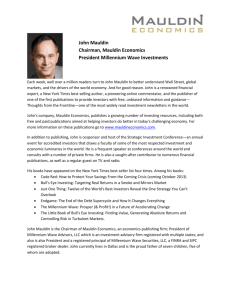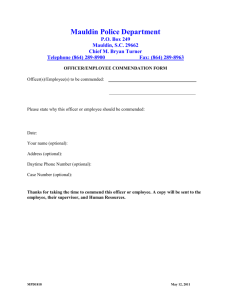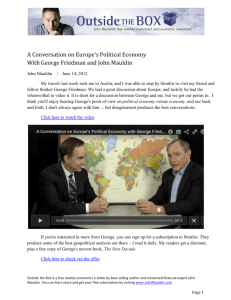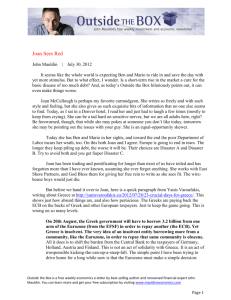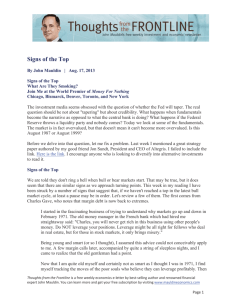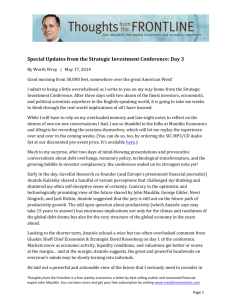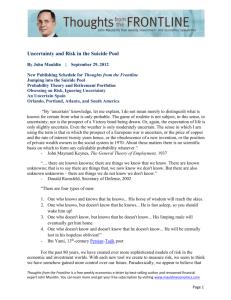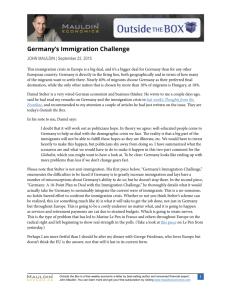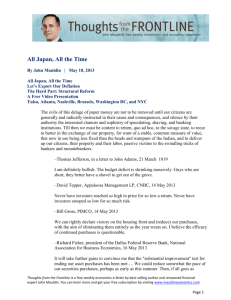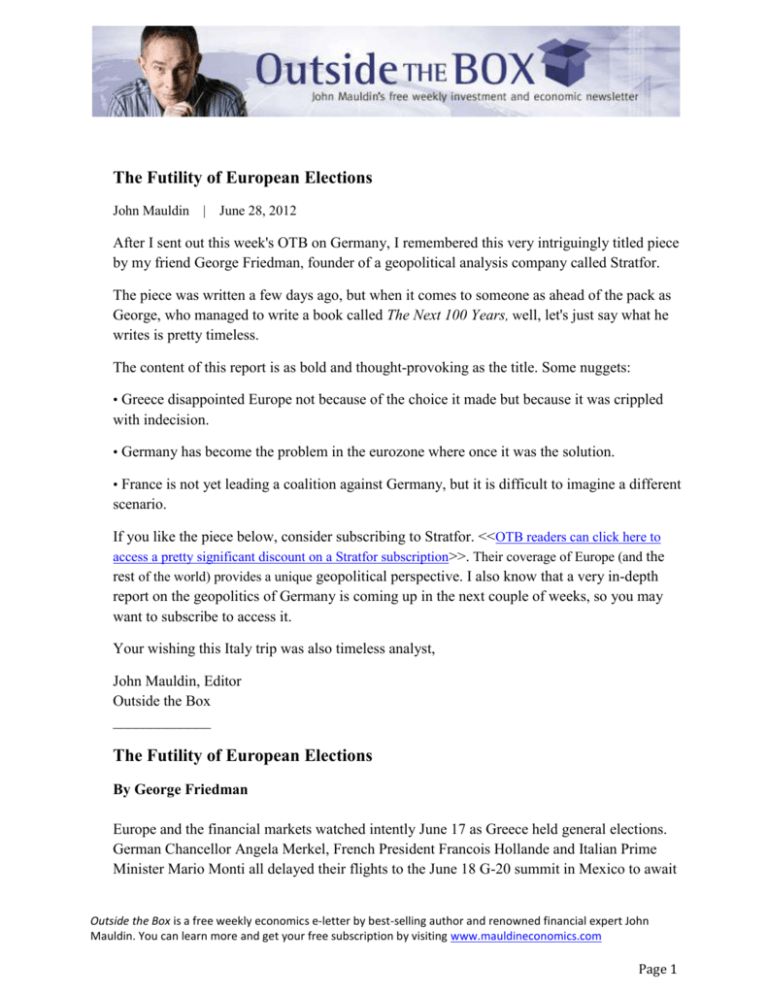
The Futility of European Elections
John Mauldin | June 28, 2012
After I sent out this week's OTB on Germany, I remembered this very intriguingly titled piece
by my friend George Friedman, founder of a geopolitical analysis company called Stratfor.
The piece was written a few days ago, but when it comes to someone as ahead of the pack as
George, who managed to write a book called The Next 100 Years, well, let's just say what he
writes is pretty timeless.
The content of this report is as bold and thought-provoking as the title. Some nuggets:
• Greece disappointed Europe not because of the choice it made but because it was crippled
with indecision.
• Germany has become the problem in the eurozone where once it was the solution.
• France is not yet leading a coalition against Germany, but it is difficult to imagine a different
scenario.
If you like the piece below, consider subscribing to Stratfor. <<OTB readers can click here to
access a pretty significant discount on a Stratfor subscription>>. Their coverage of Europe (and the
rest of the world) provides a unique geopolitical perspective. I also know that a very in-depth
report on the geopolitics of Germany is coming up in the next couple of weeks, so you may
want to subscribe to access it.
Your wishing this Italy trip was also timeless analyst,
John Mauldin, Editor
Outside the Box
_____________
The Futility of European Elections
By George Friedman
Europe and the financial markets watched intently June 17 as Greece held general elections.
German Chancellor Angela Merkel, French President Francois Hollande and Italian Prime
Minister Mario Monti all delayed their flights to the June 18 G-20 summit in Mexico to await
Outside the Box is a free weekly economics e-letter by best-selling author and renowned financial expert John
Mauldin. You can learn more and get your free subscription by visiting www.mauldineconomics.com
Page 1
the results.
The two leading contenders in the elections were the center-right New Democracy Party (ND),
which pledged to uphold Greece's commitments to austerity and honor the country's financial
agreements with the European Union and the International Monetary Fund, and the Coalition of
the Radical Left (SYRIZA), a group of far-left politicians who pledged to reject Greece's existing
agreements, end austerity and maintain the country's position in the eurozone. A third major party,
the center-left Panhellenic Socialist Movement (PASOK), shares the ND's position of maintaining
Greece's bailout agreement. PASOK had been Greece's ruling party until it formed a unity
government with the ND late in 2011.
For a while it seemed these elections would be definitive. Either Greece would reject the country's
agreement with its international lenders, potentially being forced out of the eurozone, or it
wouldn't. If Greece rejected austerity and forcibly or voluntarily left the eurozone, the country
might set a precedent for other troubled states and precipitate a financial crisis -- a eurozone exit
and default would likely go hand in hand. Europe would be tested as never before, and it would
find out how resilient it is to a wider financial crisis.
But in Europe, the least likely outcome is a definitive one. ND won the election with about 29.5
percent of the vote, earning 78 seats in parliament plus another 50 seats awarded to the winning
party by the Greek Constitution. SYRIZA received roughly 27.1 percent of the vote, equivalent to
72 seats, and PASOK received roughly 12.2 percent of the vote, or about 33 seats. The rest of the
vote was scattered among a host of other parties. A party needs 151 seats to gain an absolute
majority in parliament, but since no single party passed that threshold, a governing coalition must
be formed. So the ND needs PASOK if it is going to cobble together a governing coalition, but
PASOK has said it will not join a coalition without SYRIZA. It is unclear what a coalition would
look like between a party that wants to respect the bailout agreement and a party that wants to
reject it, but such a coalition is unlikely to happen anyway. SYRIZA wants to form a powerful
opposition. Something resembling a government eventually will be assembled regardless of
current rhetoric.
The Greek vote has settled nothing. In fact, it may not even lead to the formation of a government;
the last election failed to produce a government and forced this election. That the European crisis
most severely affected a country so politically fractious could be seen as pitiable. On the other
hand, one could argue that the crisis inevitably would be most severe in the most divided country - not because the divisions caused the crisis, but because the crisis caused the divisions.
The pressure brought on by the circumstances in Greece undermined whatever political order was
in place; the choices for policymakers were so limited and so frightening that coherent responses
Outside the Box is a free weekly economic e-letter by best-selling author and renowned financial expert, John
Mauldin. You can learn more and get your free subscription by visiting www.JohnMauldin.com
Page 2
were difficult. Greece has options, but it is unable to choose one. More than anything, Europe
wants a decision on its future, whatever that decision might be. On June 17, Greece disappointed
Europe not because of the choice it made but because it was crippled with indecision.
Crisis Management
Greece's indecisions are at the ground level of Europe. Another and more significant framework
for indecision is emerging in Franco-German relations. The French Socialist Party won an absolute
majority the same day that the Greeks entered another gridlock. This makes it possible for France's
Socialists to form a government without the Greens, giving Hollande a strong and coherent
platform from which to operate.
France's position on managing the sovereign debt crisis differs fundamentally from Germany's.
Germany has said it will not agree to proposed solutions that would essentially turn the eurozone
into a transfer union until the rest of Europe can balance their budgets through austerity measures.
Germany believes this must be the first step to further EU and eurozone integration. Hollande
takes a different position. He, too, wants greater European and eurozone integration. However,
Hollande advocates economic stimulus alongside austerity measures as a means to rebalance the
finances of European governments.
Hollande wants to grow Europe out of its financial problems. This means stimulating economies, a
process that requires deficit spending. Hollande upholds a traditional Keynesian tenet that
increasing demand for goods among consumers will increase economic activity and increase
investment. As a Socialist with a strong leftist contingent in his party, Hollande cannot support the
German position, which constrains the economy, particularly by decreasing government
expenditures, thereby depressing consumption.
The difference between the French and German approaches is substantial. It reveals a dispute at
the heart of the European strategy for managing the crisis. The Germans have been aggressive in
demanding balanced budgets. The French are becoming equally aggressive in demanding
expansionary policies. Both want to avoid defaults, but the Germans want to guarantee payments
of debt by a combination of bailout and austerity. The French want to add stimulus to this, which
changes the situation entirely because the stimulus would be funded in large part by German
coffers.
This is not a simple matter of divergent economic theory. It is a matter of national interest. France
is not as economically decrepit as Spain or Italy, let alone Greece, but nonetheless it is feeling the
pressures of the financial crisis. If Europe continues on its path toward recession, France will face
higher unemployment and therefore domestic political pressure under the German plan. It is not in
Outside the Box is a free weekly economic e-letter by best-selling author and renowned financial expert, John
Mauldin. You can learn more and get your free subscription by visiting www.JohnMauldin.com
Page 3
Hollande's or France's interests to follow the German course. For its part, Germany cannot risk
further government deficits in the European economic system. Germany's robust economy gives
the country a financial cushion to soften the effects of deficit cuts; the rest of Europe, including
France, does not have this luxury.
Interestingly, France and Germany were as one on this issue until Hollande was elected president.
Indeed, the foundation and mission of European integration has been the close alignment of
Germany and France. A founding principle of the union, such an alignment guaranteed stability
and discouraged conflicts that had torn Europe apart. Now, Europe has lost its coherence at the
highest level, albeit in a more orderly manner than in Greece.
Disharmony and Public Opinion
Of course, the situation is not that simple. What Germany says it wants differs from what it allows
to happen. Germany claims to favor disciplined austerity, but more than any other country
Germany needs the eurozone to stay intact. It is thus willing to compromise on austerity and on
underwriting bad debts. On the other hand, Germany rejects the idea that a systematic strategy to
stimulate growth is needed or likely to work. France sees no other solution, lest it face austerity
itself. Both want different fiscal policies from the members and also, logically, from the European
Central Bank.
From the most beleaguered members of the European Union to the relations between its strongest
and most stable members, there is now profound disharmony. What drives this disharmony is
public opinion. The Greek public is divided politically; therefore, Greece is paralyzed. France held
an election in which Hollande, who holds serious doubts about German policy, forced out and
replaced former French President Nicolas Sarkozy, who shared the German position on managing
the crisis.
It is not the policymakers that are divided. Rather, the electorate is driving apart policymakers. The
German solution to the problem is so unpalatable to the rest of Europe that traditional elite
politicians supporting Germany's plan, such as Sarkozy and former Greek Prime Minister George
Papandreou, are being replaced. Their replacements tend to reject the German position.
Indeed, political reality has constrained the actions of European lawmakers. Until about five years
ago, a broad consensus governed Europe when it came to EU matters, and politicians were free to
align themselves with Europe. This is no longer the case -- the solution for maintaining Europe has
diverged. Most important, Germany has become the problem in the eurozone where once it was the
solution.
Structural issues, such as German dependence on exports to the European Union, only partly
Outside the Box is a free weekly economic e-letter by best-selling author and renowned financial expert, John
Mauldin. You can learn more and get your free subscription by visiting www.JohnMauldin.com
Page 4
explain the change in Germany's public perception. More accurately, German methods for
managing the crisis increasingly are seen by other countries as significant threats to their well
being -- there is not one anti-German coalition. Germany wants to find accommodation with
France. The problem rests in how the French and German views are reconciled. France is not yet
leading a coalition against Germany, but it is difficult to imagine a different scenario.
The more elections are held, the more the public will force their leaders in various directions. More
often than not, this direction will eschew austerity and Germany. Over time this will solidify into a
new map. While this has yet to happen, the recent elections at the least are not solving Europe's
problem. In fact, they may be further dividing the Continent. And there are many elections to go.
Read more: The Futility of European Elections | Stratfor
Copyright 2012 John Mauldin. All Rights Reserved.
Share Your Thoughts on This Article
Like Outside the Box? Then we think you'll love John’s premium product, Over My
Shoulder. Each week John Mauldin sends his Over My Shoulder subscribers the most
interesting items that he personally cherry picks from the dozens of books, reports, and
articles he reads each week as part of his research. Learn more about Over My Shoulder
Outside the Box is a free weekly economic e-letter by best-selling author and renowned financial expert, John
Mauldin. You can learn more and get your free subscription by visiting http://www.mauldineconomics.com.
Please write to subscribers@mauldineconomics.com to inform us of any reproductions, including when and where
copy will be reproduced. You must keep the letter intact, from introduction to disclaimers. If you would like to quote
brief portions only, please reference http://www.mauldineconomics.com.
To subscribe to John Mauldin's e-letter, please click here: http://www.mauldineconomics.com/subscribe/
To change your email address, please click here: http://www.mauldineconomics.com/change-address
If you would ALSO like changes applied to the Mauldin Circle e-letter, please include your old and new email address
along with a note requesting the change for both e-letters and send your request to compliance@2000wave.com.
To unsubscribe, please refer to the bottom of the email.
Outside the Box and JohnMauldin.com is not an offering for any investment. It represents only the opinions of John
Mauldin and those that he interviews. Any views expressed are provided for information purposes only and should not
Outside the Box is a free weekly economic e-letter by best-selling author and renowned financial expert, John
Mauldin. You can learn more and get your free subscription by visiting www.JohnMauldin.com
Page 5
be construed in any way as an offer, an endorsement, or inducement to invest and is not in any way a testimony of, or
associated with, Mauldin's other firms. John Mauldin is the Chairman of Mauldin Economics, LLC. He also is the
President of Millennium Wave Advisors, LLC (MWA) which is an investment advisory firm registered with multiple
states, President and registered representative of Millennium Wave Securities, LLC, (MWS) member FINRA, SIPC.
MWS is also a Commodity Pool Operator (CPO) and a Commodity Trading Advisor (CTA) registered with the CFTC,
as well as an Introducing Broker (IB) and NFA Member. Millennium Wave Investments is a dba of MWA LLC and
MWS LLC. This message may contain information that is confidential or privileged and is intended only for the
individual or entity named above and does not constitute an offer for or advice about any alternative investment
product. Such advice can only be made when accompanied by a prospectus or similar offering document. Past
performance is not indicative of future performance. Please make sure to review important disclosures at the end of
each article. Mauldin companies may have a marketing relationship with products and services mentioned in this
letter for a fee.
Note: Joining the Mauldin Circle is not an offering for any investment. It represents only the opinions of John Mauldin
and Millennium Wave Investments. It is intended solely for investors who have registered with Millennium Wave
Investments and its partners at www.MauldinCircle.com or directly related websites. The Mauldin Circle may send out
material that is provided on a confidential basis, and subscribers to the Mauldin Circle are not to send this letter to
anyone other than their professional investment counselors. Investors should discuss any investment with their
personal investment counsel. John Mauldin is the President of Millennium Wave Advisors, LLC (MWA), which is an
investment advisory firm registered with multiple states. John Mauldin is a registered representative of Millennium
Wave Securities, LLC, (MWS), an FINRA registered broker-dealer. MWS is also a Commodity Pool Operator (CPO)
and a Commodity Trading Advisor (CTA) registered with the CFTC, as well as an Introducing Broker (IB). Millennium
Wave Investments is a dba of MWA LLC and MWS LLC. Millennium Wave Investments cooperates in the consulting
on and marketing of private and non-private investment offerings with other independent firms such as Altegris
Investments; Capital Management Group; Absolute Return Partners, LLP; Fynn Capital; Nicola Wealth Management;
and Plexus Asset Management. Investment offerings recommended by Mauldin may pay a portion of their fees to
these independent firms, who will share 1/3 of those fees with MWS and thus with Mauldin. Any views expressed
herein are provided for information purposes only and should not be construed in any way as an offer, an
endorsement, or inducement to invest with any CTA, fund, or program mentioned here or elsewhere. Before seeking
any advisor's services or making an investment in a fund, investors must read and examine thoroughly the respective
disclosure document or offering memorandum. Since these firms and Mauldin receive fees from the funds they
recommend/market, they only recommend/market products with which they have been able to negotiate fee
arrangements.
PAST RESULTS ARE NOT INDICATIVE OF FUTURE RESULTS. THERE IS RISK OF LOSS AS WELL AS THE
OPPORTUNITY FOR GAIN WHEN INVESTING IN MANAGED FUNDS. WHEN CONSIDERING ALTERNATIVE
INVESTMENTS, INCLUDING HEDGE FUNDS, YOU SHOULD CONSIDER VARIOUS RISKS INCLUDING THE
FACT THAT SOME PRODUCTS: OFTEN ENGAGE IN LEVERAGING AND OTHER SPECULATIVE INVESTMENT
PRACTICES THAT MAY INCREASE THE RISK OF INVESTMENT LOSS, CAN BE ILLIQUID, ARE NOT REQUIRED
TO PROVIDE PERIODIC PRICING OR VALUATION INFORMATION TO INVESTORS, MAY INVOLVE COMPLEX
TAX STRUCTURES AND DELAYS IN DISTRIBUTING IMPORTANT TAX INFORMATION, ARE NOT SUBJECT TO
THE SAME REGULATORY REQUIREMENTS AS MUTUAL FUNDS, OFTEN CHARGE HIGH FEES, AND IN MANY
CASES THE UNDERLYING INVESTMENTS ARE NOT TRANSPARENT AND ARE KNOWN ONLY TO THE
INVESTMENT MANAGER. Alternative investment performance can be volatile. An investor could lose all or a
substantial amount of his or her investment. Often, alternative investment fund and account managers have total
trading authority over their funds or accounts; the use of a single advisor applying generally similar trading programs
could mean lack of diversification and, consequently, higher risk. There is often no secondary market for an investor's
interest in alternative investments, and none is expected to develop.
All material presented herein is believed to be reliable but we cannot attest to its accuracy. Opinions expressed in
these reports may change without prior notice. John Mauldin and/or the staffs may or may not have investments in
any funds cited above as well as economic interest. John Mauldin can be reached at 800-829-7273.
Outside the Box is a free weekly economic e-letter by best-selling author and renowned financial expert, John
Mauldin. You can learn more and get your free subscription by visiting www.JohnMauldin.com
Page 6

